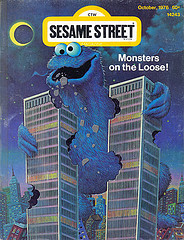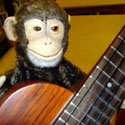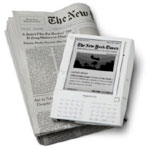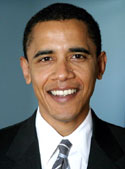 The American Library Association’s Washington Office released to the library community this month a document it created for the Obama-Biden Transition Team: “Opening the ‘Window to a Larger World’: Libraries’ Role in Changing America.” (This link goes to a PDF of the report.) The document hits all the main points that concern us library folks: copyright, privacy, LSTA funding, and, of particular interest to me, literacy.
The American Library Association’s Washington Office released to the library community this month a document it created for the Obama-Biden Transition Team: “Opening the ‘Window to a Larger World’: Libraries’ Role in Changing America.” (This link goes to a PDF of the report.) The document hits all the main points that concern us library folks: copyright, privacy, LSTA funding, and, of particular interest to me, literacy.
It begins by telling its readers, as ALA has been telling people in almost every communication with non-librarians that it publishes, and in bold type, too, “Americans are using libraries now more than ever.” I’m not certain how well it, or we library folks in general, are convincing the rest of the world that this claim is true, but it bears repeating. It also does its best to clearly state, below, in the broadest sense, what librarians do and why they’re important, and tie those things to some of the president-elect’s stated aims:
Librarians take very seriously their responsibility to serve as guardians for the public in assuring access to the most trusted, unbiased information. The ALA is ready to work with the new Administration to see President-elect Obama’s commitments to openness, transparency and equity fully realized. Libraries and librarians are critical resources for meeting these goals.
Getting into specific issues, the paper ticks off all those things on many librarians’ wish lists – things like:
* Get libraries/librarians involved in the expansion of broadband access to all parts of the country;
* Get federal agents off librarians’ backs by redoing the Patriot Act and similar laws when it comes to the privacy of library records;
* Include school libraries and school librarians in education mandates (as we all know, a major failure of George W’s “No Child Left Behind” law), and
* Enhance libraries’ abilities to participate in “e-government” – communicating with government agencies and doing government business through the Net, especially for lower-income folks without Net access.
There’s a section called “Safe computing and children,” which can be boiled down to the two first lines, and continues the ALA tradition of opposing filtering. But it’s pretty clear that filtering is here to stay in most libraries; the section’s gentler language, compared with the way these ideas were expressed during the filtering fights of earlier years, acknowledges that it’s a fight ALA has lost:
* Support legislation and fund programs that include Internet safety education, as opposed to Internet blocking and filtering;
* Emphasize the importance of parental involvement in Internet training and safety[…]
But the section of most interest to me, and the one I feel has the most chance of becoming reality, is called, “Literacy and Lifelong Learning.” You may be aware, as I mentioned a couple of posts ago, that Obama was early on converted to the need to support early childhood education and pre-literacy skills, particularly for lower-income children. These kids often don’t get the kind of language stimulation – in particular, print language stimulation and a wider vocabulary – that kids from families with middle or higher incomes do.
We still have a huge way to go in convincing the general public that libraries indeed have a role to play in helping children of all income levels gain a love and appreciation of print in all its forms. Here are a couple of the points from the document, which also emphasizes the role of libraries in aiding low-literacy adults:
* Promote partnerships between early childhood literacy programs and libraries; emphasize the contribution these literacy programs provide to aid in a child’s intellectual development;
* Promote and articulate the important role libraries serve in literacy efforts, including how libraries provide access to early learning activities for language acquisition and other learning and literacy skills for infants, toddlers, preschoolers and their families;
* Create a Presidential Early Learning Council, as envisioned by President-elect Obama, to encourage necessary dialogue among programs at the federal, state and local levels;
* Include librarians as full participants in this learning council and other literacy advisory groups [Here’s a major big deal, if there’s any way it could happen; typically, educators involved with these types of programs don’t even consider librarians worthy of joining such a team];
* Encourage private and nonprofit sectors to collect and disseminate the most valid and up-to-date research on early learning and highlight best practices and model programs at the state and local level [with the notion, I suppose, that programs involving libraries would be included];
* Review all types of federally supported literacy programs and assure appropriate planning and budgeting to support high school students and adult literacy;
* Require community partnerships between local literacy programs and local public libraries within adult literacy programs [see above, as libraries aren’t usually given consideration here, either];
* Broadly promote and emphasize the need for literacy programs and the “right to read”; through public awareness programs, encourage those needing literacy training to use every opportunity; promote literacy as an important tool to obtain employment, gain formal and informal education and to participate in the full breadth of life’s activities;
* Promote literacy programs as a tool for “hope.” [Hmm – is this different than regular hope, the kind without the quotation marks?]
I’m glad to see this document out there. But will it really make any difference? I dunno. With all the horrible pressures of the battered economy and the war in Iraq and Afghanistan getting most of the attention – and with most of the attention regarding education going to the schools and classroom teachers – will there be even a micron of space to squeeze libraries into the spotlight? I’m old and cynical enough to wonder.
 Hi, folks. Because I’m no longer doing children’s work in libraries, and have felt myself drifting further away from children’s work, I’m ending this blog.
Hi, folks. Because I’m no longer doing children’s work in libraries, and have felt myself drifting further away from children’s work, I’m ending this blog. Here’s a great story,
Here’s a great story,  Well, I don’t believe (I can’t believe!) that the Cookie Monster is really a terrorist, but he certainly looks like one for us these days on the cover of the October 1976 Sesame Street magazine. As someone who was actually in Manhattan on 9/11 (in my case, trapped underground on an E train near Times Square for a couple of hours while trying to get to work), this cover looks pretty spooky.
Well, I don’t believe (I can’t believe!) that the Cookie Monster is really a terrorist, but he certainly looks like one for us these days on the cover of the October 1976 Sesame Street magazine. As someone who was actually in Manhattan on 9/11 (in my case, trapped underground on an E train near Times Square for a couple of hours while trying to get to work), this cover looks pretty spooky. Do you remember the post not too long ago about
Do you remember the post not too long ago about  I’m starting the new year with an old song,
I’m starting the new year with an old song,  A few days ago, The New York Times ran another story about big-time changes in book publishing, called
A few days ago, The New York Times ran another story about big-time changes in book publishing, called  The American Library Association’s Washington Office released to the library community this month a document it created for the Obama-Biden Transition Team:
The American Library Association’s Washington Office released to the library community this month a document it created for the Obama-Biden Transition Team: 
 There’s a great article in the New York Times,
There’s a great article in the New York Times,  Get back to it and just do it – know what I mean? Hey folks – I know I went AWOL for a while. I needed a break, plus there’s been plenty happening in my 3-D life. But it was time, I realized, to either fold up this blog or to get busy and post, and I’m not ready to quit yet. I’m going to do my best to post stuff on a more regular basis, and I’ve been working hard on my ukulele playing, so I hope to have more uke materials to share soon.
Get back to it and just do it – know what I mean? Hey folks – I know I went AWOL for a while. I needed a break, plus there’s been plenty happening in my 3-D life. But it was time, I realized, to either fold up this blog or to get busy and post, and I’m not ready to quit yet. I’m going to do my best to post stuff on a more regular basis, and I’ve been working hard on my ukulele playing, so I hope to have more uke materials to share soon.